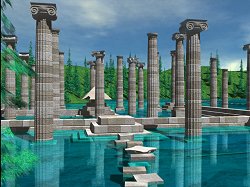|
Comer
 The first thing to say about this game is that it undoubtedly pays homage to Myst. The designer openly acknowledges this in his brief statement in the manual and the game surely confirms it. So if you are like me and enjoy thoughtful Myst-like games then Comer is well worth a look. The first thing to say about this game is that it undoubtedly pays homage to Myst. The designer openly acknowledges this in his brief statement in the manual and the game surely confirms it. So if you are like me and enjoy thoughtful Myst-like games then Comer is well worth a look.
Needless to say then, Comer is a first-person perspective game with an unidentified protagonist ... you ... as the 28th 'Comer' to journey in this hauntingly beautiful world. As with Myst, it is a game of solitary exploration and discovery and this aspect somehow heightens the ethereal quality of the various locations in the game world. Careful observation is essential as the puzzles are well-integrated into the game environment and are of the type where interpretation and experimentation are the keys to understanding. You will encounter a variety of mechanisms to operate that may open a door, or a whole new world, or simply provide information about the discoveries of those who journeyed here before you. Some of the problems are very easy to solve whilst others take quite a bit of thought, though you can't really make a mistake. The most difficult part for me was, as usual, the music or chimes puzzle which had me at a total loss for days. No matter how hard I try I'm destined to be a failure at matching tones.
There are essentially four areas to explore each contained on a separate disk, so disk swapping is not a problem. When you restore a saved game you always re-enter at the start of that particular section, but don't worry, it does record your progress up until the point you saved. You begin your exploration in a wondrous open-plan house inspired by Frank Lloyd Wright and, if you can banish the thought of window cleaning, you can just relax, look around and enjoy the atmosphere. And, of course, find out what the game is about, or at least formulate a tentative understanding. In this opening section you can get a taste of what is to come in the following chapters of your journey ... a stark hillside village, a moist, green forest and a sleeping volcano.
The game invites you to use your imagination and 'interpret' a series of wall etchings that you must first reveal to begin to understand the story. I dutifully obliged and my imagination ran wild with notions of human sacrifice and fire gods. The game isn't quite as vividly fanciful as that, but it does offer its own variation on creation myths. During the course of play there are a few short documents to read and a couple of film projector/video sequences left by your predecessors to give you some inkling of what is happening. Eventually, though, you will step beyond the experiences of the previous 'comers' and intervene in the course of events. The end might surprise you in more ways than one as it leaves you in a kind of limbo. At first I was quite taken aback that there was no decisive ending, no credits, nothing to signify 'The End', but at the same time the game succeeds in producing an utterly devastating finale. I can't say any more as I don't want to give it away, but I thought that it needed nothing more than the credits to kick in, then it would have worked perfectly.
Comer does not come out of one of the big design and publishing companies, it is produced by Shine Studio a small, essentially one-person operation. From what I can glean from the credits Kyle Choi was responsible for just about everything including the beautiful graphics and music, although he did have a little help here from Vivaldi, Grieg, Mahler and Tchaikovsky.
As with Myst, the sense of isolation that this kind of game creates really suits the puzzles and creates an almost dream-like atmosphere. It demonstrates that you don't need 3D engines or 360 degree panning to create a fascinating game world. Maybe I would ask for a cursor that is a little more sensitive so that it clearly indicates where you can and can't move and what you can interact with, but it is fairly intuitive. I'd also suggest that the dialogue in the film projector sequences could have been delivered by someone who chose to take a breath occasionally so I didn't have to repeat these sections in order to pick up every word. A text option would have helped here, though this still wouldn't aid hearing-impaired players because of the demands of the music puzzle.
Comer is a game for quiet contemplation, for players who appreciate exploring mysterious lost worlds and drawing their own conclusions. I just loved the music and, like Blue Ice that had me running around searching for Mozart's Clarinet Concerto, Comer has already sent me out in search of Mahler. The game is not available in retail outlets so you can only purchase it on the Internet at Shine Studio.
Stuck in this game? Check out Mr Bill and Lela's walkthrough.
Note: A reader has advised that Comer has compatibility problems with some high-end sound cards. If you are experiencing difficulties please refer to the list of affected sound cards and possible fix at the Shine Studio web site.
Copyright © Rosemary Young 1999.
All rights reserved.
System requirements:
Windows 95, 100MHz Pentium or faster, 16MB RAM minimum, 10MB hard disk space, 8x CD-ROM drive or faster, 800 x 600 display, 24-bit True Color preferred, 640 x 480 display, 16-bit High Color acceptable, Windows compatible sound device.
|

